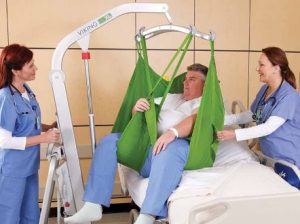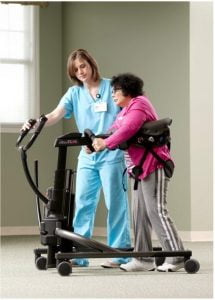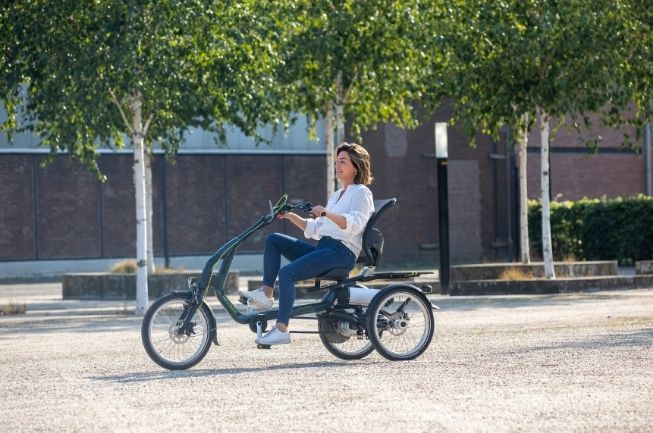Aids and equipment, or Assistive Technologies (AT), are anything that helps you maintain or improve your ability to perform a task or activity. There are many examples of assistive technology that you may come across in the NDIS, including anything from a simple walking stick to electronic beds and fancy walking frames.
Finding the right AT for your specific needs can be challenging as there are many factors that can influence these decisions; including your personal symptoms, environment and circumstances, the activity you want to participate in and who might need to help you use the equipment.
But having access to the right equipment can have life-changing effects and here’s how we can help:
At National 360, we have a team of physiotherapists who are available to help you get the equipment you need. Physiotherapists’ specialist training allows us to understand how your body, brain and environment might affect your ability to perform an activity and identify how a piece of equipment might help to give you a boost! After completing some test runs, we bridge the gap between you and the NDIS to help you access the equipment that works for you.
Activities that physiotherapists can help you find AT for:
- Mobility inside and outside the home
- Getting in and out of bed, chairs, and wheelchairs (transfer equipment)
- Manual handling (making it easier for carers to assist you)
- Standing and walking
- Completing daily tasks
- Participating in sport or recreation
- Disability-related health conditions – such as breathing or circulation problems
- And many, many more
To give you some ideas of how we’ve helped people like you achieve their goals, take a look at some examples of how our clients and physiotherapists worked together with assistive technology:

Helping you, helping them: Mr A and his hoist
Mr A is in his late 60s and has spent his life as a husband and father to his large family. Mr A and his wife want to continue to live together in their family home, however, Mr A was diagnosed with younger-onset dementia which causes him extreme difficulty getting in and out of bed/chairs and is unable to walk by himself anymore. Mr A was requiring multiple people to help him move around and this was becoming unsafe for Mr A and those supporting him.
To support Mr A and his carers, a few options were trialled to help transfer him as safely and easily as possible. Everyone agreed that a sling hoist was the safest option that would support Mr A in the event that his condition worsened. A physiotherapist is also able to assess the environment the AT will be used in to identify other details – in this case, a smaller hoist was needed to fit around tight corners in the house, and bed-raisers were required so the hoist legs could fit underneath. After a report was submitted, and the hoist approved, care was taken in training Mr A and his whole support team to use the hoist safely and in all situations.
Mr A can now use the hoist to safely get out of bed in the morning, transfer to his bathroom equipment and wheelchair throughout the day.
Helping you be you: Ms B and her mobility aid
 Ms B has lived with cerebral palsy her whole life but hasn’t been able to stand up on her own or walk for the last 5 years. When Ms B decided her goal was to be more independent with her transfers and to train herself to be able to walk with assistance, a physiotherapy assessment was able to identify equipment that could help her.
Ms B has lived with cerebral palsy her whole life but hasn’t been able to stand up on her own or walk for the last 5 years. When Ms B decided her goal was to be more independent with her transfers and to train herself to be able to walk with assistance, a physiotherapy assessment was able to identify equipment that could help her.
Once approved by the NDIS, Ms B gained access to a Rifton Tram – a hybrid patient lifter. Ms B is learning to use this device to get in and out of bed, take 50% of her body weight while standing and eventually try walking!
By understanding how Ms B’s symptoms change her movements, as well as the effects of some of her other health conditions, a physiotherapist is able to set this equipment up with just the right adjustments to help Ms B get the most benefit. At the same time, it’s been a long time since Ms B last stood up and therefore requires appropriate pacing and a strengthening program to help her achieve her goals.
Helping you do more: Mrs C and her E-Trike
Sometimes assistive technology can be fun and games! Mrs C wants to be active and maintain her functioning in the long term, plus her husband really loves cycling. Mrs C has Multiple Sclerosis (MS), which can affect her balance, strength, and endurance. While this prevents her from using a regular bicycle safely, with the help of a physiotherapist and bike specialist, she is looking forward to being approved for an Electric Tricycle.
Mrs C, along with a physiotherapist, trialled a few different modified bike options to help her achieve her goal. The E-Trike gives Mrs C some assistance in making the wheels go round so she can go cycling alongside her husband, or friends at the MS riding group without getting tired quickly or struggling up those hills. Opting for the tricycle option means Mrs C feels confident despite her balance issues and means she can venture out to the community safely on her own. Not to mention, she got to choose a super stylish carry bag to bring all her personal and medical items with her on a ride.
If you’ve had an a-ha! Moment and are thinking a physiotherapist might be able to help you with your equipment needs, or if you’re still scratching your head, please reach out to our friendly customer service team to find out how we can help you on 1300 340 440.
Or if you are ready to make a referral please visit our referrals page here.
By Ripley, Physiotherapist




